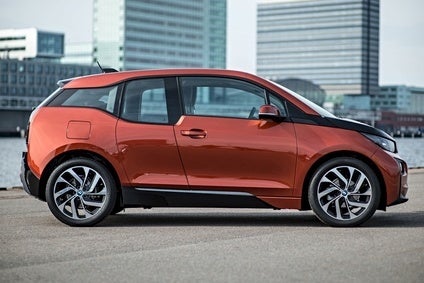
BMW’s i3 is the first 100% electric vehicle to go on retail sale here in Brazil and is now available in eight regional capital cities for nothing short of US$100,000/BRL237,000.
Other EVs like Nissans’s Leaf and some Renaults are in use with some private fleets.

Discover B2B Marketing That Performs
Combine business intelligence and editorial excellence to reach engaged professionals across 36 leading media platforms.
Automakers had been expecting incentives to slash prices but the government has only just confirmed an import tax cut from 35% to 2% for hybrid vehicles.
There is an additional incentive, though. In São Paulo City, where a third of the initial batch of 100 i3s is believed to have been sold, all EVs are exempt from the city’s working days traffic ban where road access is determined by the last digit on the licence plate.
BMW decided to import the i3 REX (Range EXtender) version with a 33.5bhp, vertical twin, petrol engine which runs a generator to charge the battery and extend range. This gives the driver a 70-mile (110km) or so reprieve on a nine-litre (two imperal gallons) fuel tank in case a charging station is not nearby.
The arrival of the i3 compact here in Brazil coincides with the imminent start of production – of other models – at the new BWW factory in Santa Catarina state. EVs attract curiosity here and the brand expects technology ‘halo’ image benefits as a result. After all, this is a car designed from scratch for maximum efficiency.
A light monocoque combines carbon fibre composites and aluminium with no central B pillar and with rear hinged rear side doors. Even tyres with specific diameter and cross sections were specially chosen to take full advantage of the electric motor’s instant torque delivery.
The 166 bhp motor enables 0-to-60km/h (37mph) sprints in just 3.9s (well quicker than normal cars) making it extremely nimble in city use. Top speed is limited to 93.8mph/150km/h to preserve range.
It has plenty of inside room with seat belts for a maximum of four occupants and the 9.2-cu ft/260-litre boot compares well with similarly sized compacts. The flat floor permits easy driver exit through the passenger side door, very convenient in city driving and in tightly spaced parking bays. Also attractive is the onboard connectivity that outclasses many cars.
With proper marketing and sharp targeting, BMW is selling the i3 at a rate matching the initial 40,000 units a year capacity without losing money while Nissan, in contrast, has just announced a reduction of in-house battery manufacturing due to lagging Leaf sales.






